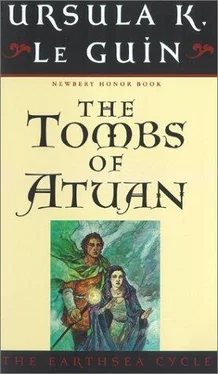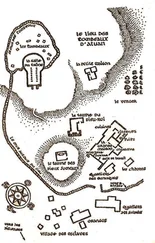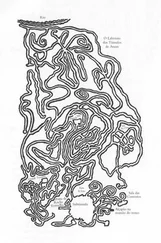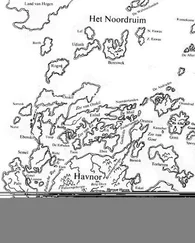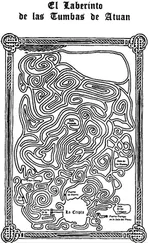Ursula Le Guin - The Tombs of Atuan
Здесь есть возможность читать онлайн «Ursula Le Guin - The Tombs of Atuan» весь текст электронной книги совершенно бесплатно (целиком полную версию без сокращений). В некоторых случаях можно слушать аудио, скачать через торрент в формате fb2 и присутствует краткое содержание. Жанр: Фэнтези, на английском языке. Описание произведения, (предисловие) а так же отзывы посетителей доступны на портале библиотеки ЛибКат.
- Название:The Tombs of Atuan
- Автор:
- Жанр:
- Год:неизвестен
- ISBN:нет данных
- Рейтинг книги:3 / 5. Голосов: 1
-
Избранное:Добавить в избранное
- Отзывы:
-
Ваша оценка:
- 60
- 1
- 2
- 3
- 4
- 5
The Tombs of Atuan: краткое содержание, описание и аннотация
Предлагаем к чтению аннотацию, описание, краткое содержание или предисловие (зависит от того, что написал сам автор книги «The Tombs of Atuan»). Если вы не нашли необходимую информацию о книге — напишите в комментариях, мы постараемся отыскать её.
The Tombs of Atuan — читать онлайн бесплатно полную книгу (весь текст) целиком
Ниже представлен текст книги, разбитый по страницам. Система сохранения места последней прочитанной страницы, позволяет с удобством читать онлайн бесплатно книгу «The Tombs of Atuan», без необходимости каждый раз заново искать на чём Вы остановились. Поставьте закладку, и сможете в любой момент перейти на страницу, на которой закончили чтение.
Интервал:
Закладка:
“Why do you ask?”
“You seemed used to begging. In fact you were good at it.”
“Well, yes. I've begged all my life, if you look at it that way. Wizards don't own much, you know. In fact nothing but their staff and clothing, if they wander. They are received and given food and shelter, by most people, gladly. They do make some return.”
“What return?”
“Well, that woman in the village. I cured her goats.”
“What was wrong with them?”
“They both had infected udders. I used to herd goats when I was a boy.”
“Did you tell her you'd cured them?”
“No. How could I? Why should I?”
After a pause she said, “I see your magic is not good only for large things.”
“Hospitality,” he said, “kindness to a stranger, that's a very large thing. Thanks are enough, of course. But I was sorry for the goats.”
In the afternoon they came by a large town. It was built of clay brick, and walled round in the Kargish fashion, with overhanging battlements, watchtowers at the four corners, and a single gate, under which drovers were herding a big flock of sheep. The red tile roofs of a hundred or more houses poked up over the walls of yellowish brick. At the gate stood two guards in the red-plumed helmets of the Godking's service. Tenar had seen men in such helmets come, once a year or so, to the Place, escorting offerings of slaves or money to the Godking's temple. When she told Ged that, as they passed by outside the walls, he said, “I saw them too, as a boy. They came raiding to Gont. They came into my village, to plunder it. But they were driven off. And there was a battle down by Armouth, on the shore; many men were killed, hundreds, they say. Well, perhaps now that the ring is rejoined and the Lost Rune remade, there will be no more such raiding and killing between the Kargish Empire and the Inner Lands.”
“It would be foolish if such things went on,” said Tenar. “What would the Godking ever do with so many slaves?”
Her companion appeared to ponder this awhile. “If the Kargish lands defeated the Archipelago, you mean?”
She nodded.
“I don't think that would be likely to happen.”
"But look how strong the Empire is– that great city, with its walls, and all its men. How could your lands stand against them, if they attacked?'
“That is not a very big city,” he said cautiously and gently. “I too would have thought it tremendous, when I was new from my mountain. But there are many, many cities in Earthsea, among which this is only a town. There are many, many lands. You will see them, Tenar.”
She said nothing. She trudged along the road, her face set.
“It is marvelous to see them: the new lands rising from the sea as your boat comes towards them. The farmlands and forests, the cities with their harbors and palaces, the marketplaces where they sell everything in the world.”
She nodded. She knew he was trying to hearten her, but she had left joy up in the mountains, in the twilit valley of the stream. There was a dread in her now that grew and grew. All that lay ahead of her was unknown. She knew nothing but the desert and the Tombs. What good was that? She knew the turnings of a ruined maze, she knew the dances danced before a fallen altar. She knew nothing of forests, or cities, or the hearts of men.
She said suddenly, “Will you stay with me there?”
She did not look at him. He was in his illusory disguise, a white-skinned Kargish countryman, and she did not like to see him so. But his voice was unchanged, the same voice that had spoken in the darkness of the Labyrinth.
He was slow to answer. “Tenar, I go where I am sent. I follow my calling. It has not yet let me stay in any land for long. Do you see that? I do what I must do. Where I go, I must go alone. So long as you need me, I'll be with you in Havnor. And if you ever need me again, call me. I will come. I would come from my grave if you called me, Tenar! But I cannot stay with you.”
She said nothing. After a while he said, “You will not need me long, there. You will be happy.”
She nodded, accepting, silent.
They went on side by side towards the sea.
Voyage
He had hidden his boat in a cave on the side of a great rocky headland, Cloud Cape it was called by the villagers nearby, one of whom gave them a bowl of fish stew for their supper. They made their way down the cliffs to the beach in the last light of the gray day. The cave was a narrow crack that went back into the rock for about thirty feet; its sandy floor was damp, for it lay just above the high-tide mark. Its opening was visible from sea, and Ged said they should not light a fire lest the night-fishermen out in their small craft along shore should see it and be curious. So they lay miserably on the sand, which seemed so soft between the fingers and was rock-hard to the tired body. And Tenar listened to the sea, a few yards below the cave mouth, crashing and sucking and booming on the rocks, and the thunder of it down the beach eastward for miles. Over and over and over it made the same sounds, yet never quite the same. It never rested. On all the shores of all the lands in all the world, it heaved itself in these unresting waves, and never ceased, and never was still. The desert, the mountains: they stood still. They did not cry out forever in a great, dull voice. The sea spoke forever, but its language was foreign to her. She did not understand.
In the first gray light, when the tide was low, she roused from uneasy sleep and saw the wizard go out of the cave. She watched him walk, barefoot and with belted cloak, on the black-haired rocks below, seeking something. He came back, darkening the cave as he entered. “Here,” he said, holding out a handful of wet, hideous things like purple rocks and orange lips.
“What are they?”
“Mussels, off the rocks. And those two are oysters, even better. Look– like this.” With the little dagger from her keyring, which she had lent him up in the mountains, he opened a shell and ate the orange mussel with seawater as its sauce.
“You don't even cook it? You ate it alive!”
She would not look at him while he, shamefaced but undeterred, went on opening and eating the shellfish one by one.
When he was done, he went back into the cave to the boat, which lay prow forward, kept from the sand by several long driftwood logs. Tenar had looked at the boat the night before, mistrustfully and without comprehension. It was much larger than she had thought boats were, three times her own length. It was full of objects she did not know the use of, and it looked dangerous. On either side of its nose (which is what she called the prow) an eye was painted; and in her halfsleep she had constantly felt the boat staring at her.
Ged rummaged about inside it a moment and came back with something: a packet of hard bread, well wrapped to keep dry. He offered her a large piece.
“I'm not hungry.”
He looked into her sullen face.
He put the bread away, wrapping it as before, and then sat down in the mouth of the cave. “About two hours till the tide's back in,” he said. “Then we can go. You had a restless night, why don't you sleep now.”
“I'm not sleepy.”
He made no answer. He sat there, in profile to her, cross-legged in the dark arch of rocks; the shining heave and movement of the sea was beyond him as she watched him from deeper in the cave. He did not move. He was still as the rocks themselves. Stillness spread out from him, like rings from a stone dropped in water. His silence became not absence of speech, but a thing in itself, like the silence of the desert,
After a long time Tenar got up and came to the mouth of the cave. He did not move. She looked down at his face. It was as if cast in copper-rigid, the dark eyes not shut, but looking down, the mouth serene.
Читать дальшеИнтервал:
Закладка:
Похожие книги на «The Tombs of Atuan»
Представляем Вашему вниманию похожие книги на «The Tombs of Atuan» списком для выбора. Мы отобрали схожую по названию и смыслу литературу в надежде предоставить читателям больше вариантов отыскать новые, интересные, ещё непрочитанные произведения.
Обсуждение, отзывы о книге «The Tombs of Atuan» и просто собственные мнения читателей. Оставьте ваши комментарии, напишите, что Вы думаете о произведении, его смысле или главных героях. Укажите что конкретно понравилось, а что нет, и почему Вы так считаете.
